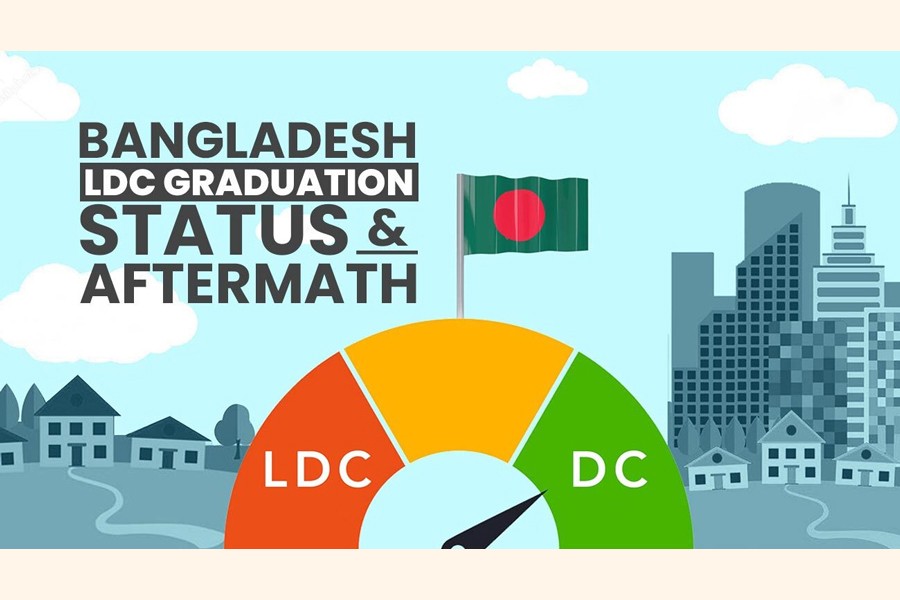03/05/2026

Govt pushes UN for 3-year LDC delay amid tariff fears
Mousumi Islam | Published: 2025-09-17 10:28:05

Bangladesh is seeking a three-year delay in its graduation from the Least Developed Country (LDC) category, with the government warning that an early transition could expose the economy to steep tariffs, reduced trade benefits and heightened competition in global markets.
Commerce Secretary Mahbubur Rahman confirmed on Tuesday that Dhaka is lobbying the United Nations for a deferment, though officials acknowledge the process will be difficult amid resistance from key development partners.
Speaking at a workshop titled “Implications of US Reciprocal Tariffs and LDC Graduation: Concerns and Options for Bangladesh”, Mahbubur Rahman said the government has initiated consultations with experts to craft a strategy.
“We are trying to bring the issue to a UN resolution so that we can defer LDC graduation by three years,” he explained.
The event, organised by the Research and Policy Integration for Development (RAPID), was attended by RAPID Chairman Mohammad Abdur Razzaque, Executive Director Prof Abu Eusuf, and Economic Reporters Forum (ERF) President Doulot Akter Mala, among others.
A challenging diplomatic battle
Mahbubur Rahman admitted that securing a delay would be far from straightforward. “To defer graduation, a resolution must be passed at the United Nations General Assembly (UNGA).
However, key development partners such as Japan, Turkey, India and the United States are not in favour of such an extension. That makes securing approval quite challenging,” he said.
While lobbying for deferment, the government is simultaneously seeking technical assistance from development partners to help manage the transition.
Mahbubur Rahman concluded his remarks with cautious optimism: “We are working to postpone the transition from LDC by three years. Efforts are being made to retain trade benefits for a few more years. While there is little room for optimism, there is also no reason to be completely disappointed.”
Bangladesh was added to the UN’s LDC list in 1975, four years after the category was first established. The country is currently set to graduate on 24 November 2026, having met the United Nations Committee for Development Policy (UNCDP) criteria. Of the 44 nations classified as LDCs today, most are in Africa.
Businesses fear the fallout
The campaign for deferment comes amid mounting concern from the private sector. Business leaders argue that Bangladesh remains ill-prepared for graduation, warning of severe challenges to competitiveness once preferential trade benefits are withdrawn, particularly under schemes like the EU’s Everything But Arms (EBA) initiative.
At a seminar earlier this week, trade bodies urged the government to delay graduation by at least five to six years, citing weak export diversification, fragile competitiveness, and looming exposure to higher tariffs.
Presenting a paper at the RAPID workshop, Dr Razzaque projected that Bangladesh’s exports to the United States could fall by 14% within a year if the Donald Trump administration’s proposed 20% tariff takes effect.
RAPID’s projections suggest other exporting nations would also face sharp losses: China’s exports to the US could fall by 58%, India’s by 48%, Vietnam’s by 28%, and Indonesia’s by 27%.
Mixed signals from government
Despite the Commerce Ministry’s active lobbying, senior figures in the interim government have dismissed the idea of a deferment.
On 13 September, Chief Adviser’s Special Assistant Anisuzzaman Chowdhury categorically ruled out any delay.
“The interim government has no intention of delaying the LDC graduation process, nor does it have the scope to do so,” he said.
These conflicting positions have deepened uncertainty for businesses and development experts, who warn that inadequate preparation could leave Bangladesh dangerously exposed in global markets once graduation takes effect.
Editor & Publisher : Md. Motiur Rahman
Pritam-Zaman Tower, Level 03, Suite No: 401/A, 37/2 Bir Protik Gazi Dastagir Road, Purana Palton, Dhaka-1000
Cell : (+88) 01706 666 716, (+88) 01711 145 898, Phone: +88 02-41051180-81